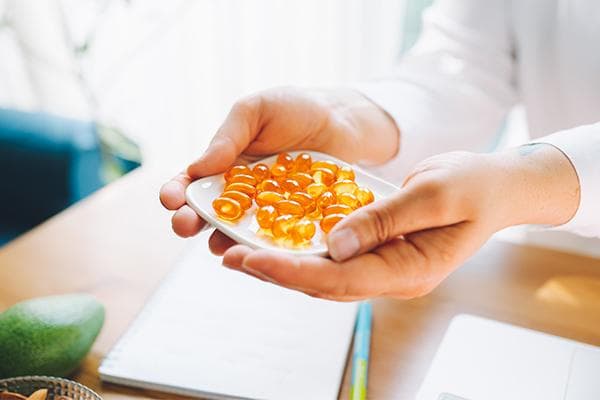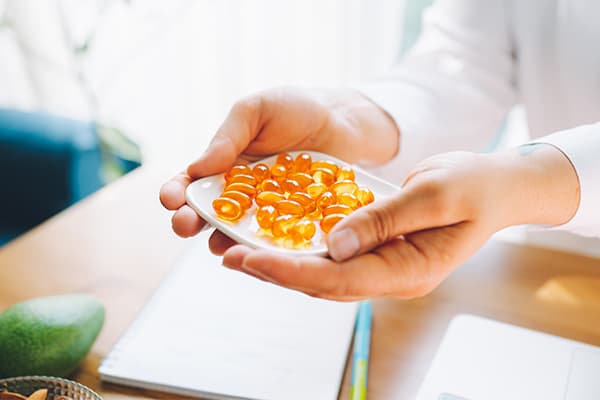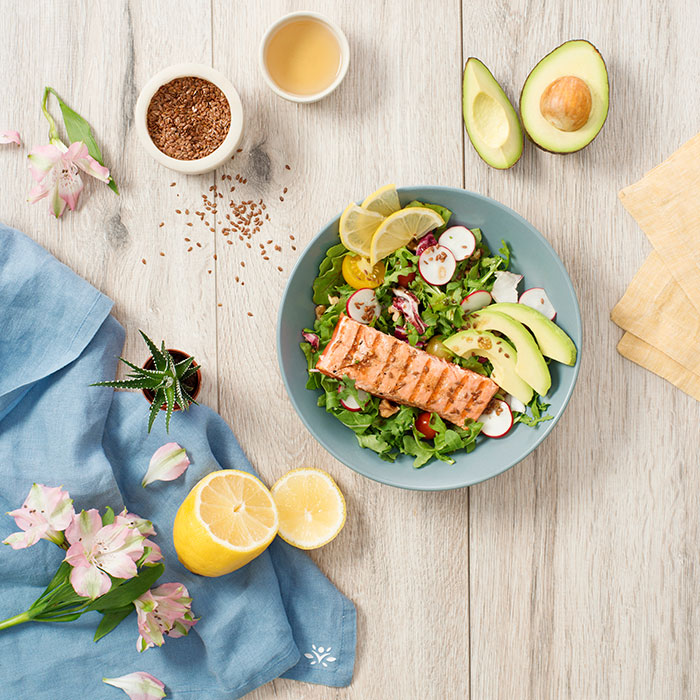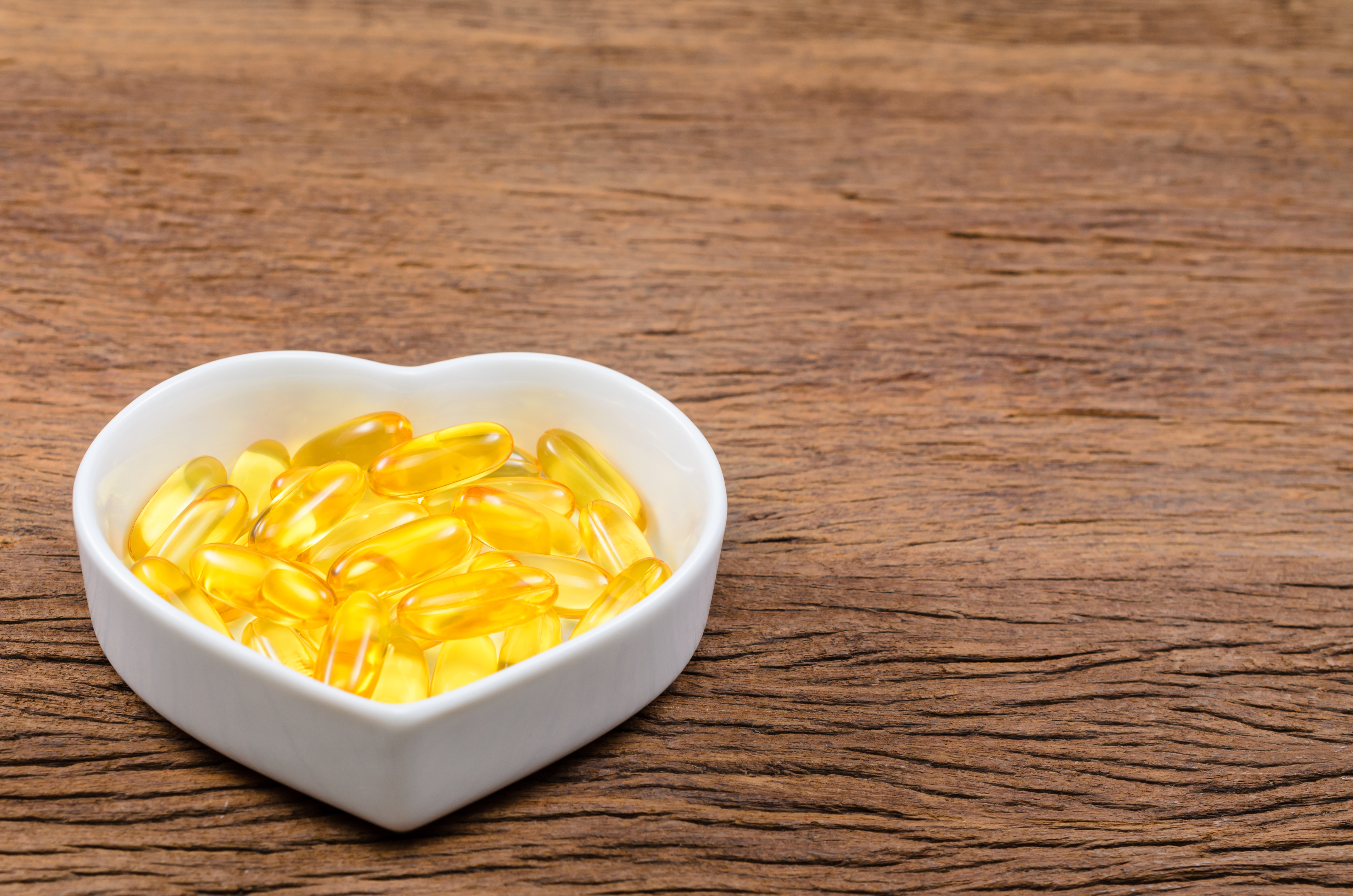Benefits of Krill Oil vs. Fish Oil
Fish oil supplements are among the most commonly used in the United States.1 The widely-studied benefits of fish oil and the healthy omega-3 fatty acids it provides made this supplement an obvious choice. But recently, nutritional researchers and health-conscious consumers alike are turning their attention toward krill oil for a few excellent reasons.
Like fish oil, krill oil is naturally loaded with healthy omega-3 essential fatty acids — namely Eicosapentaenoic Acid (EPA) and Docosahexaenoic Acid (DHA). Omega-3 essential fatty acids may support cardiovascular health, healthy cognitive function, joint health and a lot more.2 But krill oil may also offer some advantages over other marine oils for getting your daily dose of omega-3s.
Difference Between Krill Oil and Fish Oil
With krill oil supplements becoming so popular, many people are wondering about the most significant differences between krill oil and fish oil. You may have taken fish oil for a long time and now wonder if it’s worth switching from fish oil to krill oil, or you may be new to taking omega-3 supplements altogether. Either way, in this article we hope to answer all your questions about the differences between the two oils and the potential advantages of both.
Fish Oil vs Krill Oil
There are several differences between fish oil and krill oil, including the sources of the oils used in the supplements, the nutrients and nutritional values within the supplements and how your body absorbs those nutrients.
1. Is Krill Oil the Same as Fish Oil?
Although both supplements contain omega-3 fatty acids and the sources for both supplements are ocean-dwellers, the two oils come from very different places.
Fish oil can come from a variety of fish including anchovies, halibut, herring, mackerel, salmon, sardines, cod and albacore tuna. The fish used for making fish oil supplements may be either wild-caught or farmed.
Krill, on the other hand, are very tiny, shrimp-like crustaceans that live in the waters of Antarctica and feed on plankton.3 Because they are in the same family as shrimp, people who have shellfish allergies should avoid taking krill oil supplements.
2. Krill Oil May Be Absorbed Better Than Fish Oil
Research suggests that although both supplements contain EPA and DHA omega-3 fatty acids, the fatty acids from krill may be absorbed better by our bodies.4 The omega-3 fatty acids in krill are bound to phospholipids4 which allows them to be released into the bloodstream and cells at a more efficient rate. As a result, you might be able to take less (which could mean smaller, potentially easier to swallow pills) and still enjoy the same health benefits as fish oil. And as a bonus, krill oil doesn’t cause fishy burps like fish oil can.
3. Krill Oil Contains Other Nutrients
Krill oil also contains other nutrients such as phospholipids, choline, and astaxanthin, the carotenoid antioxidant. Choline is an essential precursor to acetylcholine, a stimulatory neurotransmitter. It's involved in healthy brain function and essential for normal cellular function.
Astaxanthin is a high-powered antioxidant with a molecular structure that makes it very effective at neutralizing free radicals. This super-carotenoid offers many benefits of its own that are complementary to the benefits of omega-3 fatty acids, including supporting healthy skin,5 eyes,6 weight7 and brain health. You can read more about astaxanthin in the article Astaxanthin Benefits.
Is Krill Oil Better Than Fish Oil?
The omega-3 fatty acids in krill oil may be more accessible for your body to absorb, and you get a few bonus nutrients in krill oil as well, but there are some situations in which fish oil may be a better choice. Most importantly, people who are allergic to shellfish shouldn’t take krill oil supplements, but if they don’t have allergies to other types of fish, they may be able to take fish oil (just read the label carefully and consult with your doctor). Krill oil is a rich source of phosphatidylcholine, a derivative of choline, which plays an important role in cellular membrane structure, thereby helping to regulate lipid metabolism. Krill oil, such as found in this formula, can also help promote healthy skin by increasing levels of omega-3 fatty acids in the body to support elasticity and hydration of skin tissues.
Fish oil may also provide other advantages, including higher total concentrations of DHA and EPA per supplement, and fish oil is usually less expensive than krill oil. But remember that your body may absorb the omega-3 fatty acids from krill more readily than fish oil, so the lower amount of DHA and EPA in krill oil may be better absorbed than the higher amounts listed in fish oil. Additionally, krill oil naturally contains high levels of phosphatidylcholine, which is a derivative of choline that plays important roles in cellular membrane structure, helping to regulate lipid metabolism, and in healthy cognitive function.
Which is Better: Krill Oil or Fish Oil?
To demonstrate some of the differences between the nutrients in fish oil vs. krill oil, we’ve broken down a few of our favorite fish oil and krill oil formulas:
- High Concentrate Omega-3 (SWE095) — 1.14 g contains 680 mg EPA/DHA combined, sourced from a blend of anchovies, herring, mackerel and/or sardines
- Lemon Flavor Omega-3 Fish Oil (SW1253) — One gram contains 180 mg EPA and 120 mg DHA, sourced from anchovies and sardines
- Super EPA Fish Oil (SWE026) — One gram contains 300 mg EPA and 200 mg DHA, sourced from anchovies, sardines and mackerel
- 100% Pure Krill Oil (SWE059) — One gram (two 500 mg capsules) contains 120 mg EPA and 55 mg DHA, plus 80 mcg astaxanthin sourced from krill
- Maximum Strength Krill Oil (SWE065) — One gram contains 120 mg EPA and 55 mg DHA, plus 80 mcg astaxanthin sourced from krill. The added benefit of including astaxanthin comes from astaxanthin’s ability to cross the cellular membrane, providing protection against oxidative stress.
Krill Oil Dosage
There is no standard intake of fish oil, krill oil or any other omega-3 supplement. An appropriate dose depends on age, health and other conditions.8 If you’re not sure how much you should take, check with your doctor or nutritionist first, but research has provided some intake suggestions. Studies have shown that consuming at least 200 mg of DHA9 and 220 mg of EPA10 daily is linked with potential health benefits, including heart health, cognitive support, mood support and more.8,10 And the American Heart Association recommends one gram of combined EPA and DHA daily to support heart health.11
Since the omega-3 fatty acids in krill oil are more easily absorbed than standard fish oil, you may be able to take smaller doses of omega-3 fatty acids from krill oil and still get the same benefits. Most krill oil supplements are available in doses of one gram, providing around 120 mg of DHA and 55 mg of EPA per dose, along with 80 mcg of astaxanthin. This is particularly beneficial, as astaxanthin provides antioxidant support for healthy and moisturized skin, exercise performance and healthy aging and may support healthy blood flow to support ocular health and immune support.
Swanson's Commitment to Sustainable, Eco-Friendly Krill Oil
Promoting your personal health without putting the health of the environment or marine ecosystems in jeopardy is the best scenario. Environmentally conscious consumers are concerned that commercially harvesting krill could threaten the many marine animals that rely on krill as the main component of their diet. Swanson understands those concerns and thinks it’s essential to opt for sustainable supplements, which is why it works with suppliers that care as much about sustainable, eco-friendly practices.
The krill biomass is among the largest on the planet, and just a small fraction is caught each year for human nutrition. We would need to consume much more krill to cause overfishing, and to make sure that doesn’t happen, we use Superba2™ krill oil for many of our supplements.
Superba2™ krill oil is produced by Aker BioMarine of Norway, which uses patented Eco-Harvesting technology to ensure optimal freshness and prevent unnecessary bycatch. Eco-Harvesting results in minimal environmental impact, reflecting Aker’s commitment to sustainable fishing practices.
Krill Oil or Fish Oil?
In short, this oil is "krillin’ it" in the omega-3 nutrition scene. Given the potential advantages of krill oil over fish oil, it should come as no surprise that krill oil is quickly becoming the most popular source of essential fatty acids.
We hope this post has helped you better understand the differences between krill oil and fish oil. If you're looking for a vegan source of omega-3 fatty acids, try Swanson's award-winning Plant Based Omega-3 supplement.
And since we’re on the topic of healthy fatty acids, you might want to check out these posts as well: The Benefits of Krill Oil and Be Fat Fluent: Best Fatty Foods for Your Diet.

About Amy Sunderman, MS, RD
Amy is a registered dietitian, nutritionist and author with more than 20 years of experience in the supplement industry. Amy is passionate about dietary supplements and the health benefits they offer. She enjoys working to find novel nutritional ingredients with strong clinical research behind them to drive innovation and provide health-promoting products to consumers.
*These statements have not been evaluated by the Food and Drug Administration. These products are not intended to diagnose, treat, cure, or prevent any disease.
Sources
1. Omega-3 Fatty Acids Fact Sheet. National Institutes of Health. Read source
2. Omega-3 Fatty Acids. National Institutes of Health. Read source
3. What Are Krill? American Oceans. Read source
4. Krill Oil vs. Fish Oil. HealthLine. Read source
5. Preventative Effects. PLOS One. Read source
6. Effect of Multiple Dietary Supplements. Current Medicinal Chemistry. Read source
7. Natural Products. North American Journal of Medical Science. Read source
6. Krill Oil Overview. WebMD. Read source
9. Health Benefits of Docosahexaenoic Acid (DHA). National Library of Medicine. Read source
10. Eicosapentaenoic Acid (EPA). Mt. Sinai. Read source
11. Vitamin Supplements. American Heart Association. Read source.




